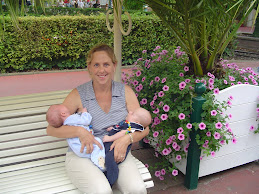Well, I think it's fairly safe to say I have a crush on the vice-principal. Called the deputy principal here in Australia. Otherwise known as Melinda. Or Miss Melinda to the kids.
You see Germany, it IS possible to show respect without the ''Sie'' form of address. And using first names.
''But how do you show respect then? And how does that person know you are showing them respect if you don't address them formally?''
I think there's a fundamental problem with a society that only knows how to show respect to others through words.
We are all in a position to receive and show respect simply by being human. It's not about status, wealth, noble birth, age, sex, color, race, religion, nationality or any of the other social conventions humans have come up with over the ages to make themselves feel more important than another human being. I am aware that this is a very New World concept. (And that it is often not followed there either.) But it's one the Old World would do well to learn.
Melinda shows respect by treating everyone as if they are someone special. Every single student, parent and co-worker at the school. Imagine coming to a school where everyone is considered special from one where noone is considered special. Imagine the joy of learning that you matter.
I wrote these first few paragraphs almost a week ago. And then I got stuck. Here I am lambasting poor old Germany again. I am making negative comments about one land while professing to value the positivity of another in the same breath. Shame on me. I don't want to be that person anymore.
We're all so happy with our new country and our new school that it's hard not to make comparisons. Andrew was chosen to read his essay at the school assembly this week. (It takes place every Friday and parents are encouraged to attend.) ''The school here is very different from my school in Germany.'' he began. ''Uh-oh.'' I already thought. And sure enough, the next sentence was a comparison. ''The kids here are better and nicer than the kids in Germany.'' Andrew went on and on and on about the fantastic library at Lawnton and the fact that they are allowed to play sports and borrow library books during the breaks.
It isn't that Australian kids are inherently better and nicer than German kids. In fact a good portion of them count their ancestry back to Germany. The difference lies in the social values of the two societies.
I remember Ryan's teacher in Germany telling me in first grade that she allowed the children to exclude others on the courtyard during recess because that was real life. We don't all get along as adults, she said, and so we shouldn't expect the kids to all get along either.
Hasn't anyone in Germany read ''Lord of the Flies?''
Recess in Germany was like a war-zone. Kids ran around and beat each other up practically unsupervised. If someone had a problem with another child, and took it to a teacher, they were most often told to resolve the situation themselves.
How are kids supposed to learn respect and peaceful conflict resolution if they have never been shown how?
Students at Lawnton are allowed to show up at school more than half an hour before they bell rings. They are expected to play quietly. There is adult supervision.
Imagine our surprise this week when Damon and I showed up early too and saw kids from age 6 to age 13 playing games together on the courtyard. There is no running around, no rough-housing. Groups play handball or sit and read quietly. Ryan and Andrew were both immediately accepted into a handball group, without any question of whether or not they would be included.
And Germany wonders why its behind in the international PISA rankings. It's not all about jamming the academics down their throats in the shortest amount of time possible, guys.
Character counts.
Are Australian kids naturally less aggressive, more respectful and genetically better behaved than German kids? I doubt it. But they are being raised in a society that values getting along with others. We've had 12 year old boys step out of line for the bus so that we could get on ahead of them. We've had children show us the bus schedule when we weren't sure which direction we were going in. They say 'please' and 'thank you.' I'm sure they say a few choice other things too, when we aren't around. And my guess is they can rough and tumble it with the best of them.
The difference is that such behavior isn't accepted as normal and tolerated by adult authorities at school. The difference is that they are being taught peaceful and respectful means of conflict resolution. That doesn't mean there won't be fist-fights. But it does mean that they know it's wrong.
Both my kids were honored at assembly today. Ryan forshowing all three Lawnton values of learning, respect and safety by doing her best during this week's testing and by becoming such a helpful and respectful member of the class in such a short time. (Turns out Australia is a grade ahead of Germany age-wise so that Ryan is 'repeating' fourth grade and going into fifth in January even though age-wise she should be going into sixth!) Ryan has never been honored for anything in Germany. Doing her best? Doesn't matter. Being kind? Doesn't count.
But I'm surprised at how relieved I was about Andrew. He was recognized for learning- his spelling and writing. (This despite the fact that he spelled out ''big horse'' during a spelling test when the teacher had asked them to spell 'because!') As I was home-schooling him I also realized that he was working way under his potential at grade level. But we shushed it up, didn't want to pressure Ryan, and certainly didn't want to be seen as bragging to the other parents at his previous school. It was all very hush-hush. (He'll be going into fourth grade in January.)
Shouldn't the child be allowed to be happy about his academic achievements? Why are we telling him to keep them quiet?
So that I have both, a child who needs extra help academically and a child who excels. How nice that the school has programs for both (as well as a special education program), so that they can learn in the same school, with children their own age. And, in the process, learn that everyone is different, but everyone has value.
It's hard not to fall in love with a school and a country that treats you like you matter.
Subscribe to:
Post Comments (Atom)



No comments:
Post a Comment